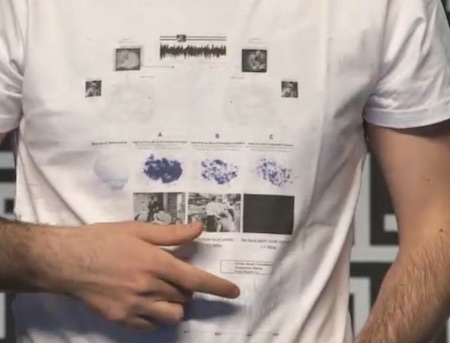Science Fiction
Dictionary
A B C D E F G H I J K L M N O P Q R S T U V W X Y Z
Moran Cerf, When Will We Get Neuro Tech For Ourselves?

MIT's Media Lab had a great streaming talk today by Moran Cerf, a professor of neuroscience and business at the Kellogg School of Management and the neuroscience program at Northwestern university. He also studies patients undergoing brain-surgery to examine behavior, emotion and decision making. This is accomplished by recording the activity of individual nerve cells using electrodes implanted in the patient's brain for clinical purposes.
Twitter users were invited to submit questions; I asked:
"How long will it be until this technology is mature/cheap enough for individual people who want to hack their own minds?" #MLTalks
— Bill Christensen (@Technovelgy) April 23, 2015I was only able to jot down some of his response, so this is paraphrased:
In 2010, a story that I had perfected dream control went viral; I was asked by businesses about it, they. wanted to option it. Even though I don't have it... they still wanted it. And then 4 years it became possible.I think surgery, surgical implantation is the best way. However, I hope to replace this method with non-invasive methods, which are better...
SF stories are next. SF authors can write a script. They tap into millions of minds, we can tell that people have peak engagement. So how does a person sit in office and see what everyone wants?
I agree that prices are going down. However, real knowledge is a problem, but the world is not yet ready. people are not there yet.

(I also liked his t-shirt)
Science fiction fans have been reading stories that engage them, and stoke their imaginations. In his 1977 novel A Scanner Darkly, Philip K. Dick makes extensive use of the cephalochromoscope, a consumer device used for relaxation:
"Your cephalochromoscope that cost you nine hundred dollars, that you always turn on and play when you get home - Ernie and Barris were babbling away about it. They tried to use it today and it wouldn't work. No colors and no ceph patterns, neither one..."
(Read more about the cephalochromoscope or cephscope)
Note that the root words for cephalo-chromo-scope literally means "brain" - "color" + "watch or see".
SF movie fans may recall the 1983 movie Brainstorm, starring Christopher Walken and Natalie Wood. In the film, a team of scientists creates "The Hat, a special helmet that is able to read sensations from one person's brain and write them to tape so that others are able to experience them.
If brainwave-sensing consumer products tickle your fancy, take a look at the The Hair Brush That Reads Your Mind and the Hitachi Brain Scanner Fun Toy.
More about Moran Cerf; via MIT (I'll update this).
Scroll down for more stories in the same category. (Story submitted 4/23/2015)
Follow this kind of news @Technovelgy.| Email | RSS | Blog It | Stumble | del.icio.us | Digg | Reddit |
Would
you like to contribute a story tip?
It's easy:
Get the URL of the story, and the related sf author, and add
it here.
Comment/Join discussion ( 0 )
Related News Stories - (" Medical ")
Bone-Building Drug Evenity Approved
'Compounds devised by the biochemists for the rapid building of bone...' - Edmond Hamilton, 1932.
BrainBridge Concept Transplant Of Human Head Proposed
'Briquet’s head seemed to think that to find and attach a new body to her head was as easy as to fit and sew a new dress.' - Alexander Belaev (1925)
Natural Gait With Prosthetic Connected To Nervous System
'The leg was to function, in a way, as a servo-mechanism operated by Larry’s brain...' - Charles Recour, 1949.
Brain Implant Is Able To Capture Your Inner Dialogue
'So you see, you can hide nothing from me.'
Technovelgy (that's tech-novel-gee!) is devoted to the creative science inventions and ideas of sf authors. Look for the Invention Category that interests you, the Glossary, the Invention Timeline, or see what's New.
Science Fiction
Timeline
1600-1899
1900-1939
1940's 1950's
1960's 1970's
1980's 1990's
2000's 2010's
Current News
The New Habitable Zones Include Asimov's Ribbon Worlds
'...there's a narrow belt where the climate is moderate.'
Can One Robot Do Many Tasks?
'... with the Master-operator all you have to do is push one! A remarkable achievement!'
Atlas Robot Makes Uncomfortable Movements
'Not like me. A T-1000, advanced prototype. A mimetic poly-alloy. Liquid metal.'
Boring Company Drills Asimov's Single Vehicle Tunnels
'It was riddled with holes that were the mouths of tunnels.'
Humanoid Robots Tickle The Ivories
'The massive feet working the pedals, arms and hands flashing and glinting...'
A Remarkable Coincidence
'There is a philosophical problem of some difficulty here...'
Cortex 1 - Today A Warehouse, Tomorrow A Calculator Planet
'There were cubic miles of it, and it glistened like a silvery Christmas tree...'
Perching Ambush Drones
'On the chest of drawers something was perched.'
Leader-Follower Autonomous Vehicle Technology
'Jason had been guiding the caravan of cars as usual...'
Golf Ball Test Robot Wears Them Out
"The robot solemnly hit a ball against the wall, picked it up and teed it, hit it again, over and again...'
Boring Company Vegas Loop Like Asimov Said
'There was a wall ahead... It was riddled with holes that were the mouths of tunnels.'
Rigid Metallic Clothing From Science Fiction To You
'...support the interior human structure against Jupiter’s pull.'
Is The Seattle Ultrasonics C-200 A Heinlein Vibroblade?
'It ain't a vibroblade. It's steel. Messy.'
Roborock Saros Z70 Is A Robot Vacuum With An Arm
'Anything larger than a BB shot it picked up and placed in a tray...'
A Beautiful Visualization Of Compact Food
'The German chemists have discovered how to supply the needed elements in compact, undiluted form...'
Bone-Building Drug Evenity Approved
'Compounds devised by the biochemists for the rapid building of bone...'
